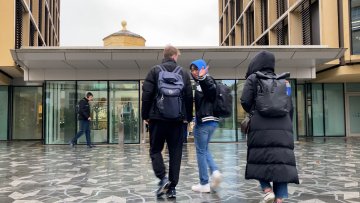17:00
The Koponen Conjecture
Abstract
15:30
Frobenius categories and Homotopy Quantum Field Theories
Abstract
Topological Quantum Field Theories (TQFTs) have been studied as mathematical toy models for quantum field theories in physics and are described by a functor out of some bordism category. In dimension 2, TQFTs are fully classified by Frobenius algebras. Homotopy Quantum Field Theories (HQFTs), introduced by Turaev, consider additional homotopy data to some target space X on the bordism categories. For homotopy 1-types Turaev also gives a classification via crossed G-Frobenius algebras, where G denotes the fundamental group of X.
In this talk we will introduce a multi-object generalization of Frobenius algebras called Frobenius categories and give a version of this classification theorem involving the fundamental groupoid. Further, we will give a classification theorem for HQFTs with target homotopy 2-types by considering crossed modules (joint work with Alexis Virelizier).
Organisational meeting
Abstract
Please attend if you would like to give a talk in the Logic Advanced Class this term.



